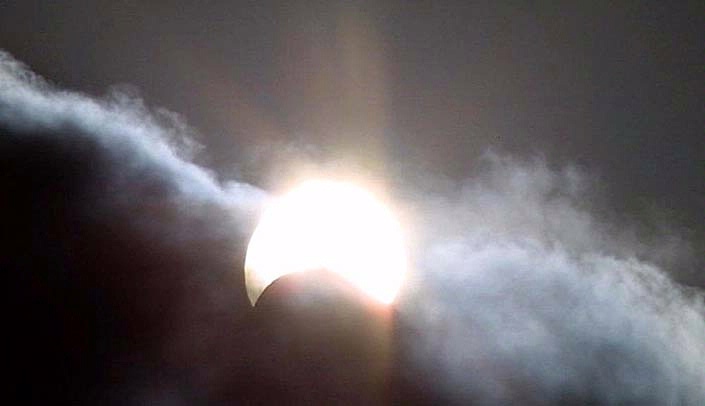Safely watching the eclipse
- Carefully look at your solar filter or eclipse glasses before using them. If you see any scratches or damage, do not use them. Check the ISO paperwork to make sure it is complete and it meets ISO 12312-2 International Safety Standards. If they meet the standard, you shouldn’t be able to see anything through a solar filter except the sun itself or something comparably bright, such as a bright-white LED flashlight on your smartphone. All such sources should appear quite dim through a solar viewer. If you can see lights of more ordinary brightness through your eclipse glasses or handheld viewer, and you’re not sure if the product came from a reputable vendor, it should not be used. Safe solar filters produce a view of the sun that is comfortably bright (like the full moon), in focus, and surrounded by dark sky.
- Always read and follow all directions that come with the solar filter or eclipse glasses. Help children to use handheld solar viewers and eclipse glasses correctly.
- Before looking up at the bright sun, stand still and cover your eyes with your eclipse glasses or solar viewer. After glancing at the sun, turn away and remove your filter. Do not remove it while looking at the sun.
- The only time that you can look at the sun without a solar viewer is during a total eclipse. This only occurs in certain areas of Nebraska. When the moon completely covers the sun’s bright face and it suddenly gets dark, you can remove your solar filter to watch this unique experience. Then as soon as the bright sun begins to reappear slightly, immediately use your solar viewer again to watch the remaining partial phase of the eclipse.
- Never look at the uneclipsed or partially eclipsed sun through an unfiltered camera, telescope, binoculars or other similar devices. This is important even if you are wearing eclipse glasses or holding a solar viewer at the same time. The intense solar rays coming through these devices will damage the solar filter and your eyes.
A solar eclipse will take place on Aug. 21. People interested in viewing the event need to keep some important safety tips in mind.
During a total eclipse, the sun gradually disappears behind the moon and then reappears. Glowing like a halo, only the sun’s outer atmosphere can be seen from behind the moon.
Depending on your location, a partial eclipse, during which the moon covers a portion of the sun, lasts from two to three hours. The total solar eclipse only lasts two to three minutes and will be visible from Scottsbluff to Falls City, Neb.
As Nebraskans are gearing up to witness such an inspiring natural occurrence, it is important to keep eye and vision safety in mind.
Looking directly at the sun without proper glasses can seriously damage the eyes. Staring at the sun for even a short time without wearing the right eye protection can damage your retina permanently resulting in a blindness called solar retinopathy.
It is also known as photic retinopathy and eclipse retinopathy. It refers to a photochemical toxicity that results in injury to the retina. This entity is commonly associated with sun-gazing or eclipse viewing, and often results in moderate vision loss and central blind spot.
Some recovery can occur over the course of one to six months after the sun exposure, though visual recovery may be incomplete and patient may suffer from permanent visual acuity deficits.
The only safe way to look directly at the sun, whether during an eclipse or not, is through special-purpose solar filters. These solar filters are used in “eclipse glasses” or in handheld solar viewers. They must meet a very specific worldwide standard known as ISO 12312-2. Even very dark sunglasses cannot protect your eyes while looking directly at the sun.
Remember — no matter where you observe the eclipse, looking directly at the sun especially when it is partially covered by the moon, can cause serious eye damage or even blindness.
Please refer to the American Academy of Ophthalmology website or the American Optometric Association website for a more information.

Thank you Dr. Suh for this information!
Are the sunglasses available anywhere on the UNMC campus to purchase?
I'd like to know about glasses for purchase as well. It seems these are difficult to come by, not that the event is near.
There are no glasses for sale on the UNMC campus.